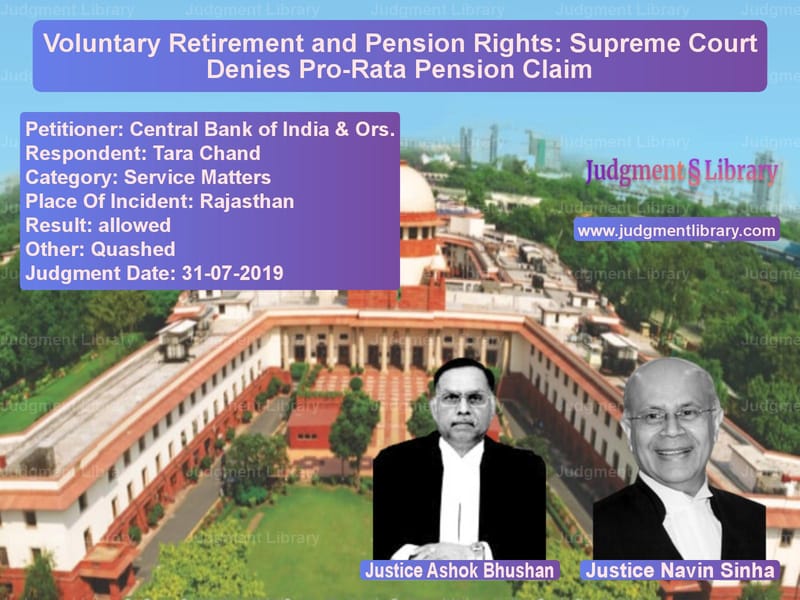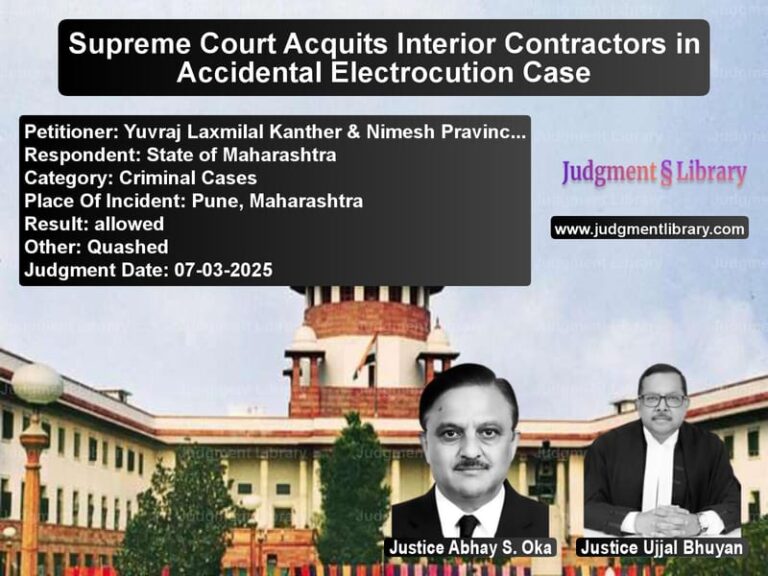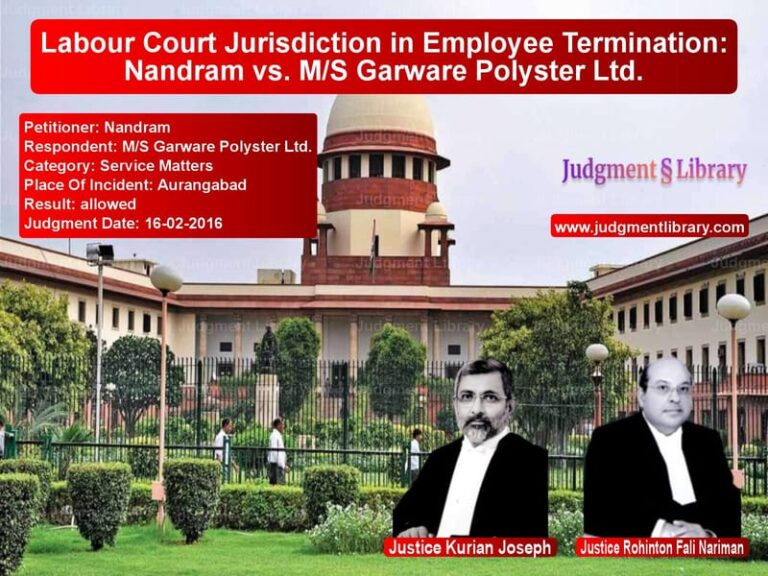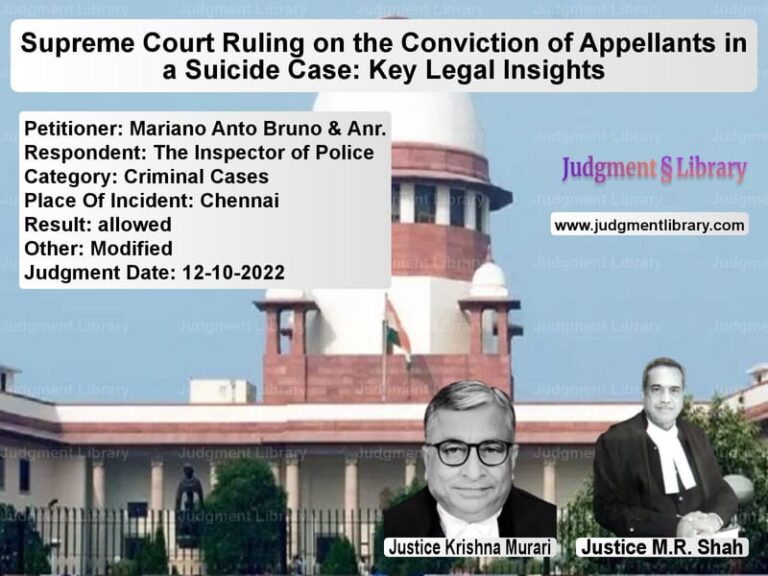Voluntary Retirement and Pension Rights: Supreme Court Denies Pro-Rata Pension Claim
The case of Central Bank of India & Ors. v. Tara Chand involves the question of whether an employee who opted for voluntary retirement under the Central Bank of India Employees Voluntary Retirement Scheme, 2001 (VRS 2001) is entitled to pro-rata pension under the Central Bank of India (Employees’) Pension Regulations, 1995. The Supreme Court ruled against the employee, stating that he was not eligible for pension as he had not completed the required minimum service under the pension regulations.
Background of the Case
The respondent, Tara Chand, was an employee of the Central Bank of India. He had opted for the pension scheme under the Central Bank of India Employees’ Pension Regulations, 1995, which was later amended in 2000. In 2001, he applied for voluntary retirement under VRS 2001, which was accepted. However, the Bank denied him pension benefits on the ground that he had not completed the required 15 years of service.
Key Facts of the Case
- The Central Bank of India introduced the Employees’ Pension Regulations, 1995, which allowed employees to opt for pension benefits.
- The respondent opted for pension under the 1995 regulations, and his option was accepted by the Bank.
- On February 22, 2001, the Bank launched the Voluntary Retirement Scheme (VRS) 2001, which was open for applications until March 8, 2001.
- The respondent applied for voluntary retirement on February 23, 2001, which was accepted by the Bank on March 26, 2001.
- The Bank issued an order on September 12, 2001, denying him pro-rata pension benefits.
- The respondent challenged the Bank’s decision before the Rajasthan High Court.
- The Single Judge of the High Court ruled in favor of the respondent, directing the Bank to provide him with pro-rata pension.
- The Division Bench of the High Court upheld the Single Judge’s order.
- The Central Bank of India then appealed to the Supreme Court.
Arguments of the Parties
Petitioner’s (Central Bank of India) Argument
- The Bank argued that under the Pension Regulations, 1995, employees opting for voluntary retirement were entitled to pension only if they completed a minimum of 15 years of service.
- The respondent had served for only 11 years, making him ineligible for pension benefits.
- The VRS 2001 stated that pension benefits would be provided only as per the 1995 pension regulations.
- The Bank relied on previous Supreme Court judgments, including Bank of Baroda v. Ganpat Singh Deora (2009) and Punjab National Bank v. Ram Kishan (2014), which ruled that employees must fulfill the eligibility criteria of the pension regulations.
Respondent’s (Tara Chand’s) Argument
- The respondent contended that under Clause 6(ii) of VRS 2001, employees who opted for voluntary retirement were entitled to pension.
- He relied on Regulation 14 of the 1995 Pension Regulations, which states that employees who have completed 10 years of service qualify for pension.
- The High Court correctly held that the Bank was wrong in denying him pension benefits.
- He relied on the Supreme Court’s ruling in Bank of India v. K. Mohandas (2009), which allowed pension benefits under voluntary retirement schemes.
Supreme Court’s Analysis
Applicability of the Pension Regulations
The Court examined whether the respondent’s voluntary retirement under VRS 2001 qualified as ‘retirement’ under the Pension Regulations, 1995. It ruled:
“Voluntary retirement in the case of the respondent is not retirement which is covered within the definition of Clause 2(y).”
Minimum Service Requirement
The Court emphasized that Regulation 28 of the Pension Regulations, after its amendment in 2000, required a minimum of 15 years of service for employees opting for voluntary retirement. It stated:
“Since the respondent had completed only 11 years of service, he was not eligible for pension under the pension regulations.”
Precedents on Voluntary Retirement and Pension
The Court relied on its previous rulings, including:
- Bank of Baroda v. Ganpat Singh Deora (2009): Employees opting for voluntary retirement must meet the eligibility conditions of pension regulations.
- Punjab National Bank v. Ram Kishan (2014): Employees who retire voluntarily before completing 15 years of service are not eligible for pension.
Distinction from Bank of India v. K. Mohandas
The respondent relied on the Supreme Court’s judgment in Bank of India v. K. Mohandas, which had allowed pension benefits under a different voluntary retirement scheme. However, the Supreme Court distinguished that case, stating:
“The decision in K. Mohandas is not applicable, as the respondent had not completed the required 15 years of service.”
Final Judgment
The Supreme Court set aside the High Court’s judgment and ruled in favor of the Central Bank of India.
“We are of the view that the High Court has not correctly interpreted the Scheme and the Regulations.”
The Court dismissed the respondent’s claim for pension benefits and reaffirmed that eligibility conditions under the pension regulations must be met.
Significance of the Judgment
- Clarifies Pension Eligibility: Employees who opt for voluntary retirement must meet the minimum service requirement of the pension regulations.
- Limits Scope of Judicial Review: Courts cannot grant pension benefits unless statutory eligibility conditions are met.
- Consistency in Pension Laws: The ruling aligns with previous Supreme Court judgments, ensuring uniform application of pension regulations.
- Protects Financial Stability of Banks: The decision prevents undue financial burden on banks by ensuring only eligible employees receive pension.
Conclusion
The Supreme Court’s judgment in Central Bank of India v. Tara Chand reinforces the principle that pension eligibility must be determined strictly in accordance with statutory regulations. The ruling ensures that voluntary retirement schemes do not override existing pension laws and prevents ineligible employees from claiming benefits. This decision serves as an important precedent in employment and pension law.
Petitioner Name: Central Bank of India & Ors..Respondent Name: Tara Chand.Judgment By: Justice Ashok Bhushan, Justice Navin Sinha.Place Of Incident: Rajasthan.Judgment Date: 31-07-2019.
Don’t miss out on the full details! Download the complete judgment in PDF format below and gain valuable insights instantly!
Download Judgment: Central Bank of Indi vs Tara Chand Supreme Court of India Judgment Dated 31-07-2019.pdf
Direct Downlaod Judgment: Direct downlaod this Judgment
See all petitions in Pension and Gratuity
See all petitions in Employment Disputes
See all petitions in Judgment by Ashok Bhushan
See all petitions in Judgment by Navin Sinha
See all petitions in allowed
See all petitions in Quashed
See all petitions in supreme court of India judgments July 2019
See all petitions in 2019 judgments
See all posts in Service Matters Category
See all allowed petitions in Service Matters Category
See all Dismissed petitions in Service Matters Category
See all partially allowed petitions in Service Matters Category







